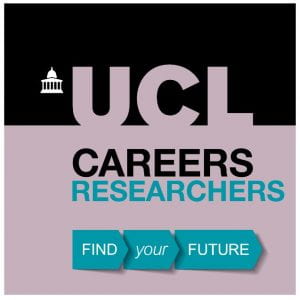Key takeaways from UCL’s Researchers Professional Careers Beyond Academia Conference
By s.duran, on 28 June 2021
This year’s Researchers Professional Careers Beyond Academia Conference took place over three days earlier this month, with a specific focus on Life and Health Sciences. We heard from a variety of great speakers, both PhD holders and employers, who shared their experiences, knowledge, and tips on moving into industry from academia. So, what did we learn from each session?

Careers in Life & Health Sciences across Industry
Covering clinical trials, medical communications, strategic consultancy and industry research, our keynote panel gave us a small flavour of the types of roles available to researchers in industry, and reflections on making the jump. Long before her role as a Senior Global Trial Manager at IQVIA, Fatima Farzana started planning her future career. Her advice to researchers? “Look at your values to help you map out potential career paths – then apply across the board”. Identifying the values that are important to you can help you narrow down your industry search, and target the types of roles you would excel in.
All four speakers discussed how they found that crucial first role of academia and their recommendations for making the leap. This included:
- Accessing careers service advice – UCL Careers offers one-to-one appointments with Careers Consultants, CV reviews, interview prep, and a range of events and workshops dedicated to researchers.
- Job advertisements – Sometimes the obvious answer is the correct one. You won’t find your next role if you aren’t looking for it.
- Networking – Meeting and engaging with the right people can often lead to new opportunities.
Networking was consistently raised as a critical factor in landing an industry job – but how can you avoid common mistakes in your networking efforts? Matt Harms, Associate Principal Scientist at AstraZeneca, has experienced networking requests first-hand. His advice? “Never say ‘I just want a foot in the door’ – always be genuinely interested in the role you’re applying for”.
What is the Future of Research?
This second session brough together individuals from a variety of backgrounds to discuss their thoughts on the future of research and researcher careers. David Bogle, Pro-Vice-Provost of the Doctoral School oversees Early Career Researchers at UCL. He sees the future of research as innovation, saying “we are training researchers to innovate within and beyond academia”. In response to a question asking if leaving academia is only for those who can’t ‘hack it’, David, who has worked both in industry and academia, said, “this attitude shows a lack of imagination in those who can’t perceive any other path.” – with agreement from panellists.
Across the panel, there was acknowledgement of the failures and identity issues researchers encounter. Jennifer McGowan, a recently appointed lecturer at UCL, shared a list of about 20 positions she was unsuccessful in securing, and commented that the full list is much longer. Sheona Scales, Paediatric Lead for Research and Innovation at Cancer Research UK, recalled questioning herself during her early days as a researcher and in industry. Nirmesh Patel, who was named as one of Forbes 30 Under 30 through his work with Cambridge Cancer Genomics concluded with, “Everyone is winging it, why not you?”.
What does a post post-doctoral career look like?
To spotlight the additional challenge that comes with moving from a post-doctoral career to industry, a dedicated Q&A session was added to this year’s programme to hear from people who have done just that. Below are a few key questions and answered shared by our panellists.
Question: Is there an optional time to switch?
Hannah Boycott, who is a Programme Manager for the Medical Research Council, was happy with her decision to switch from a post-doc to industry after 10 years. She built up skills, was able to travel, and work in a wide variety of places around the world. Diane Sutherland, Group Development Director at Fishawack Health commented that they hire people across the spectrum – both just out of their PhD and those with 10+ years of post-doc experience. Sarah Farrow, Recruitment Consultant at CK Science shared her perspective regarding one of the biggest challenges in moving from post-doc positions to industry. She cautioned researchers may need to have flexible salary requirements, especially when making the first move to industry.
Question: What skills did you need in industry that you didn’t gain from your PhD?
Beth Rycroft, an Associate Director for Global Medical Affairs, shared that she had to quickly upskill herself in simplifying the science, interpreting data that you didn’t produce yourself, changing presentation style to suit the audience, and working in a team. Hannah mentioned the importance of learning business language, such as ‘stakeholder’ and ‘funding landscape’, and getting over inferiority complex when in the room with big names. Diane commented that getting feedback on things can be quite daunting at first, as lots of colleagues will comment on your work, and you will be working with experts as it’s not your research. She also mentioned working to deadlines, as you’re charging out your time and getting past perfectionism – a trait common in many researchers.
Managing your Journey Beyond Academia
In the final session, UCL alumni alongside a UCL Careers Consultant spoke to current students and staff about what they can be doing now to prepare for their career journey.
Rebecca McKelvey, Founder and CEO of in2scienceUK, highlighted the valuable support she received from UCL Innovation and Enterprise when founding her charity, , and discussed that employability skills are exactly what researchers possess – problem solving, independence, resilience, communication skills and adaptability.
Tim Geach, Senior Publishing Manager at Springer Nature, states that his employer requires new hires to hold a PhD. They greatly value PhD experience, and even more so, post-doctoral experience. He stated that he enjoys his ability to work across different subjects, and the various routes that were available to him within publishing.
Crystal Ruff is a Senior Executive in Life Sciences & Transaction Advisory Services at EY-Parthenon. She worked clinically for ten years before moving into consulting and obtained her MBA to support her industry career. However, she stated that an MBA is not a requirement to enter strategic consulting. The skills are needed, but how you got them isn’t important.
A Deputy Head at UCL Careers, Calum Leckie obtained his PhD in plant-based biology and spent eight years as a post-doc. He came into this role after reflecting on his values, and found he enjoyed mentoring and supporting people. He saw the confusion in career paths of others and found a role to help researchers with their own career journeys.
So what can researchers be doing now to developing skills outside of their research?
Matt states you should be learning about the industries you want to go into. Don’t list what skills and attributes you have for a role without referencing what the role is and what you can offer and relate your skills to what’s needed. For example, if you want to write, then show evidence of writing. Rebecca recommended that you should look at what you want to go into and then find ways to develop those skills. For example, you could organise an event, support public engagement or outreach, or gain teaching experience. Calum recommended you do things within your research environment. Network to access the hidden jobs market – roles that aren’t advertised, or that may be coming up. Get work experience, and update your LinkedIn profile.
 Close
Close












